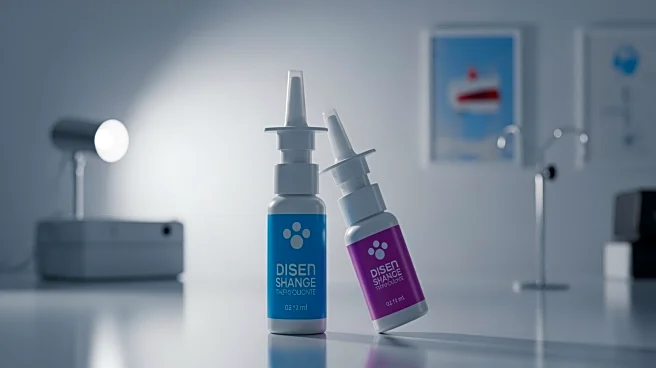What's Happening?
Amgen and AstraZeneca's Tezspire has received FDA approval for use in treating chronic rhinosinusitis with nasal polyps (CRSwNP) as an add-on maintenance therapy for patients aged 12 and older. This marks
Tezspire's second indication following its approval for severe asthma. The drug is now positioned as a direct competitor to Sanofi and Regeneron's Dupixent, which was the first approved therapy for CRSwNP. Tezspire's approval is based on the results of the WAYPOINT phase 3 trial, which demonstrated significant reductions in nasal polyp severity and systemic corticosteroid use, as well as a near-elimination of the need for surgery compared to placebo. The drug's once-monthly subcutaneous administration offers a convenience advantage over Dupixent, which requires bi-weekly injections.
Why It's Important?
The approval of Tezspire for CRSwNP represents a significant advancement in the treatment of this chronic inflammatory sinus disease, which affects approximately 320 million people worldwide. The drug's entry into the market as a competitor to Dupixent could lead to increased options and potentially lower costs for patients. Tezspire's ability to work higher up the inflammatory cascade may offer better relief for patients who have struggled with recurring symptoms and surgeries. The approval also strengthens Amgen and AstraZeneca's position in the biologics market, with Tezspire already achieving blockbuster sales figures. This development could lead to further growth opportunities, especially if Tezspire gains approval for other indications such as chronic obstructive pulmonary disease (COPD).
What's Next?
With Tezspire's approval for CRSwNP, Amgen and AstraZeneca are likely to focus on expanding its market presence and exploring additional indications. The drug's potential use in treating COPD, which affects hundreds of millions globally, could further boost its sales and market share. The companies may also invest in marketing strategies to highlight Tezspire's advantages over existing treatments, such as its less frequent dosing schedule. As the competition with Dupixent intensifies, stakeholders will be watching for any shifts in pricing or insurance coverage that could impact patient access to these therapies.
Beyond the Headlines
The approval of Tezspire highlights the ongoing innovation in biologics targeting complex inflammatory diseases. This development underscores the importance of personalized medicine approaches that address specific pathways in disease management. The success of Tezspire could encourage further research into epithelial biology and its role in inflammatory conditions, potentially leading to new therapeutic options for other related diseases. Additionally, the competitive landscape in the biologics market may drive further advancements and collaborations among pharmaceutical companies.









